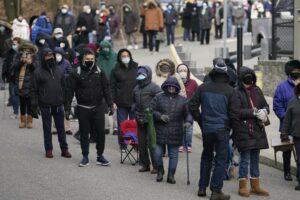Pandemic-related job loss nixes health insurance for nearly 200,000

North Carolinians interested in the fate of Medicaid expansion certainly are familiar with the characters and well-worn script, by now.
Now, in the middle of a pandemic, when many are losing jobs and health insurance and finding access to health care even more difficult at the precise time it should not be, expansion advocates took to the stage again to try to share their story in a different light.
Their performance was a virtual one. On Zoom, a stage that’s become all the more popular as COVID-19 circles the globe.
The N.C. advocates for expansion altered their well-worn script to include new numbers from the pandemic:
- There could be from 100,000 to 191,500 North Carolinians among the newly uninsured.
- Expanding Medicaid not only would help them provide care that is important for the public’s health, it also could lead to the creation of jobs in rural areas where hospitals have shuttered.
North Carolina is one of a dwindling number of states that has resisted taking billions of dollars of federal money to cover the Medicaid costs for hundreds of thousands of low-income workers who make too much to be eligible for the state- and federally funded program, but who also make too little to qualify for subsidized health insurance created as part of the 2010 Affordable Care Act.
As in many dramas where the characters are familiar and the script has been all too familiar, it’s difficult to imagine a different outcome.
In North Carolina, this production has been running since early 2013 when the North Carolina General Assembly removed the power of a governor to unilaterally expand Medicaid to cover low-income uninsured people.
No matter how much the audience and many of the actors hang onto their seats for a different outcome, the leadership in the state Senate is unlikely to take leave of its well-rehearsed lines.
No expansion.
“I don’t expect to see movement on any of these based on what we’re seeing from the legislature right now,” said Erica Palmer Smith, head of the Care4Carolina coalition that sponsored the video conference call on Tuesday. “I don’t see a pathway for any of these bills, based on legislative leadership’s statements and their intent not to deal with the coverage gap issue at this time.”
In advocates’ minds, the advent of the coronavirus pandemic has created an even stronger imperative to change the narrative around Medicaid expansion. Hundreds of thousands of North Carolina’s workers have lost their jobs since COVID-19 arrived in the state in early March, and as they lost their jobs, they’ve also lost insurance coverage.
Spotlight on increased need
A flurry of new research is attempting to put numbers behind the job losses.
It can be challenging to calculate rates of uninsurance, with tracking data about the number of uninsured usually lagging real time by more than a year. The U.S. Census currently displays data from 2019, which shows that 12.9 percent of North Carolinians lack coverage. The latest estimate of the rate of insurance from the North Carolina Institute of Medicine dates from fall 2018.
So, researchers have to look to other sources to make their estimates.
“It’s going to take us a year before we fully understand the economic consequences, the health care consequences of the pandemic,” said Jason Gray, an economist with the NC Rural Center during Tuesday’s webinar.
Gray cited recent statistics from the North Carolina Department of Commerce that show about 478,776 working-age adults lost their jobs as a result of COVID-19 in March, April and May.
He matched these numbers to a survey done by the Commonwealth Fund showing that 21 percent, to as many as 40 percent, of the newly unemployed lost health care coverage. Taken together, Gray estimated that as many as 191,000 could have lost coverage, not to mention their family members, who were covered under their policies.
“These are folks who are unable to afford their health needs, who are going to be economically distressed from, from being able to seek help,” he said. “These are people in dire need, and these are working people.”
Even before the start of the coronavirus pandemic, about 16 percent of North Carolina adults under the age of 65 were uninsured, the sixth-highest rate in the nation.
Gray’s estimates jive with a new report out Tuesday from Families USA estimates that at least 20 percent of working-age adults in North Carolina now lack insurance. Add to that their families’ losses of insurance, Families USA reckoned that at least 238,000 North Carolinians became uninsured this past spring.
Medicaid expansion would cover many, if not all, of these people, picking up 90 percent of the costs.
Economic benefit
According to an analysis done by researchers from the Economic Policy Institute using federal Department of Labor data, about 9 percent of North Carolina’s labor force were receiving unemployment insurance by the end of June, about 432,351 individuals. More than a quarter million (253,496) had also applied for or received pandemic unemployment assistance of $600/ month from the federal government.
Their analysis shows about 476,000 people lost employer-sponsored health insurance.
The federal benefits have, in many cases, kept these workers’ lives and families intact. But the benefits are slated to sunset at the end of this month if Congress does not take further action. According to the Economic Policy Institute, a national policy think tank, Congressional inaction on this score could result in a total of 142,496 permanent job losses in this state.
The Rural Center’s Jason Gray talked about how in the most economically distressed counties in North Carolina, expansion would create a billion-dollar economic impact in the form of jobs, revenue to health care providers and all of the ripple effects created by economic activity. In addition, Medicaid expansion could provide up to $14 billion in local tax revenue throughout the state.
He said while most of Medicaid expansion’s additional jobs would take place in urban areas, the policy would also have a dramatic impact on rural coffers.
“Even in, say, in northeastern North Carolina, 1,200 jobs, 2,500 jobs down the far southwest,” he argued. “Even our most rural areas are going to benefit in terms of jobs.”
“It’s really important to realize that the greatest predictor of health is socioeconomic status and that’s comprised of three things: income, occupation and education,” said Karen Winkfield, an oncologist from Wake Forest Baptist Hospital and their director of community outreach. “We know that right now, income is being hammered by COVID-19.
“But someone’s occupation … can oftentimes dictate whether or not someone has access to health care.”
Plot twists
Medicaid is designed to be a safety net program that is counter cyclical, meaning that when the economy tanks, Medicaid rolls increase.
To date, though, North Carolina’s Medicaid enrollment has increased only modestly, by 100,665 beneficiaries (4.4 percent) since February, a smattering compared to the large number of people who lost employer sponsored insurance when they were laid off as a result of COVID-19 closures.
According to state Medicaid Director Dave Richard, Medicaid hasn’t bumped up much because of the federal legislation passed by Congress this spring which included those pandemic unemployment benefits. That’s allowed many people to keep paying their premiums and hold onto their coverage.
Many employers also kept people on insurance in the short term, even as they instituted furloughs.
There’s an even bigger reason recently laid-off workers haven’t swelled Medicaid’s rolls: it is almost impossible for a non-disabled childless adult to qualify for the program in North Carolina. Instead, all of the program expansion is among children.
Richard said he expects that as the supplemental unemployment payments phase out at the end of July more families will feel the hurt.
“We project that we’ll see a significant increase in enrollment as we go throughout this year,” Richard said. “The thing that’s difficult for us and every other state is to actually have a prediction model that works here. Because this, as we’ve all said, this is a totally different type of event. It’s not a typical recession, it’s something that has impacted people in different ways.
“You will continue to see those numbers rise and then depending how long, what happened to our economy, how long the public health emergency is in place … a significant increase.”
Because the General Assembly failed to expand the Medicaid program, many of these newly unemployed will eventually become uninsured, a plot twist not affecting people who lost jobs in expansion states.
According to insurance analysts Health Management Associates, Medicaid enrollment will likely increase dramatically around the country, while a “disproportionate share of the newly uninsured will be in non-expansion states.”
If the state had expanded, many of the newly uninsured would have fallen into the income range that would have the stcare, something of a happy ending.
Instead, HMA’s analysis notes that people in the 14 states that did not expand Medicaid, including North Carolina, comprise 30 percent of the individuals losing employer-sponsored coverage. Tragically, though, they will comprise 70 percent of those who will be newly uninsured by the end of the year.
The Article was originally published on Pandemic-related job loss nixes health insurance for nearly 200,000.







